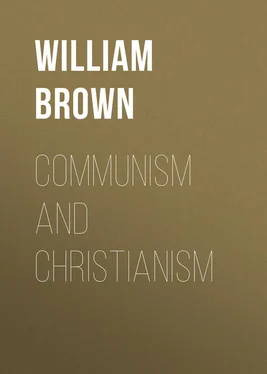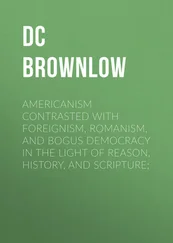William Brown - Communism and Christianism
Здесь есть возможность читать онлайн «William Brown - Communism and Christianism» — ознакомительный отрывок электронной книги совершенно бесплатно, а после прочтения отрывка купить полную версию. В некоторых случаях можно слушать аудио, скачать через торрент в формате fb2 и присутствует краткое содержание. ISBN: , Жанр: foreign_antique, foreign_prose, на английском языке. Описание произведения, (предисловие) а так же отзывы посетителей доступны на портале библиотеки ЛибКат.
- Название:Communism and Christianism
- Автор:
- Жанр:
- Год:неизвестен
- ISBN:http://www.gutenberg.org/ebooks/30758
- Рейтинг книги:3 / 5. Голосов: 1
-
Избранное:Добавить в избранное
- Отзывы:
-
Ваша оценка:
- 60
- 1
- 2
- 3
- 4
- 5
Communism and Christianism: краткое содержание, описание и аннотация
Предлагаем к чтению аннотацию, описание, краткое содержание или предисловие (зависит от того, что написал сам автор книги «Communism and Christianism»). Если вы не нашли необходимую информацию о книге — напишите в комментариях, мы постараемся отыскать её.
Communism and Christianism — читать онлайн ознакомительный отрывок
Ниже представлен текст книги, разбитый по страницам. Система сохранения места последней прочитанной страницы, позволяет с удобством читать онлайн бесплатно книгу «Communism and Christianism», без необходимости каждый раз заново искать на чём Вы остановились. Поставьте закладку, и сможете в любой момент перейти на страницу, на которой закончили чтение.
Интервал:
Закладка:
But the god of Christianism, though none the less symbolic, but rather more so, is an unreal imaginary spirit, a magnified man without a body, above an imaginary vault, and only a very small part of the world sincerely worships him.
International socialism of the Marxian or Russian type, is for those who starvingly live by working, the most uplifting thing in the world, and for those who surfeitingly live by owning, it is the most depressing thing in the world.
Wise people consider theories without losing too much, if any, sleep on their account, but they study conditions and lie awake nights over them.
Millions of wise Americans have, in the past, been studying socialism as a theory but, in the future, they will study it as a condition, in the only way by which it can rightly and adequately be studied – the way of reading its official documents, accredited periodicals and books. Of all such, the most notable is the Communist Manifesto by Marx and Engels.
This Manifesto is the Marxian gospel. I read two pages in it every day as faithfully as ever I read a chapter in the Jesuine gospel, and with much greater profit; for, whereas the gospel of Marx is exclusively concerned with this terrestrial world, about which I know much and for which I can do a little, the gospel of Jesus is as exclusively concerned with a celestial world, about which I know nothing and for which I cannot do the least. Here, as a sample of this gospel, I give half of yesterday's reading and most of today's:
The immediate aim of the Communists (Socialists) is the same as that of all the other proletarian parties; formation of the proletariat into a class, overthrow of the bourgeois supremacy, conquest of political power by the proletariat.
The theoretical conclusions of the Communists are in no way based on ideas or principles that have been invented, or discovered, by this or that would-be universal reformer.
They merely express, in general terms, actual relations springing from an existing class struggle, from a historical movement going on under our very eyes. The abolition of existing property relations is not at all a distinctive feature of Communism.
All property relations in the past have continually been subject to historical change consequent upon the change in historical conditions.
The French Revolution, for example, abolished feudal property in favor of bourgeois property.
The distinguishing feature of Communism is not the abolition of property generally, but the abolition of bourgeois property. But modern bourgeois private property is the final and most complete expression of the system of producing and appropriating products, that is based on class antagonism, on the exploitation of the many by the few.
In this sense, the theory of the Communists may be summed up in the single sentence: Abolition of private property.
We Communists have been reproached with the desire of abolishing the right of personally acquiring property as the fruit of a man's own labor, which property is alleged to be the groundwork of all personal freedom, activity and independence.
Hard-won, self-acquired, self-earned property! Do you mean the property of the petty artisan and of the small peasant, a form of property that preceded the bourgeois form? There is no need to abolish that; the development of industry has, to a great extent, already destroyed it, and is still destroying it daily.
Or do you mean modern bourgeois private property?
But does wage-labor create any property for the laborer? Not a bit. It creates capital, i. e., that kind of property which exploits wage-labor, and which cannot increase except upon condition of getting a new supply of wage-labor for fresh exploitation. Property, in its present form, is based on the antagonism of capital and wage-labor. Let us examine both sides of this antagonism.
To be a capitalist, is to have not only a purely personal, but a social status in production. Capital is a collective product, and only by the united action of many members, nay, in the last resort, only by the united action of all members of society, can it be set in motion.
Capital is therefore not a personal, it is a social power.
When, therefore, capital is converted into common property, into the property of all members of society, personal property is not thereby transformed into social property. It is only the social character of the property that is changed. It loses its class-character.
Let us now take wage-labor:
The average price of wage-labor is the minimum wage, i. e., that quantum of the means of subsistence, which is absolutely requisite to keep the laborer in bare existence, as his labor merely suffices to prolong and reproduce a bare existence. We by no means intend to abolish this personal appropriation of the products of labor, an appropriation that is made for the maintenance and reproduction of human life, and that leaves no surplus wherewith to command the labor of others. All that we want to do away with is the miserable character of this appropriation, under which the laborer lives merely to increase capital, and is allowed to live only insofar as the interest of the ruling class requires it.
In bourgeois society, living labor is but a means to increase accumulated labor. In Communist society, accumulated labor is but a means to widen, to enrich, to promote the existence of the laborer.
In bourgeois society, therefore, the past dominates the present; in Communist society, the present dominates the past. In bourgeois society capital is independent and has individuality, while the living person is dependent and has no individuality.
And the abolition of this state of things is called by the bourgeois, abolition of individuality and freedom! And rightly so. The abolition of bourgeois individuality, bourgeois independence, and bourgeois freedom is undoubtedly aimed at.
The version of the Marxian gospel which we have in the Manifesto is among the first of its versions. It was published about the middle of the last century. Within the short period which has intervened, it has changed nearly all of the ideas of a large and rapidly growing part of every nation about almost everything social; and before the middle of the present century, it will revolutionize all nations as it has Russia.
Ludendorff, the greatest among the military authorities in Germany, saw and terribly feared this, and called Europe to arms to prevent it. In his almost frantic appeal he said:
Bolshevism is advancing now and in a gradual progress from east to west and is crushing everything between the midland sea and the Atlantic ocean. It was easy to foresee that the Bolshevist armies would attack toward the middle of May and defeat the Poles, as they have now done. The world at large must, therefore, figure with a Bolshevist advance in Poland toward Berlin and Prague.
Poland's fall will entail the fall of Germany and Czecho-Slovakia. Their neighbors to the north and south will follow. Fate steps along with elementary force. Let no one believe it will come to a stand without enveloping Italy, France and England. Not even the Seven Seas can stop it.
Under the capitalist system most people are and must continue to be slaves. If you are a slave (all wage earners, as such, are slaves) the socialist literature, the greatest of all literatures, will thrill you with the hope of liberty. Read, note and inwardly digest it. No wage earner who does this will ever again vote either the Democratic or the Republican ticket. As a whole this literature is a brilliantly illuminating and almost resistlessly persuasive explanation of the most sane, the most salutary and withal the most promising movement towards the freeing of all toiling men, women and children (nine of every ten) from their body and soul destroying slavery.
Both Socrates and Jesus are recorded as teaching that the saviour of the world is truth. Among saving truths (there is no truth without some saving efficacy) the greatest is the one which was discovered and formulated concurrently by Karl Marx and Frederick Engels and it is in substance this: all which makes for the good of mankind ultimately depends wholly upon the laborious constructors and operators of the machines for the cultivation, production and distribution of the necessities of life, not at all upon the owners of these machines, who at best are idlers and at worst schemers, and in any case parasites.
Читать дальшеИнтервал:
Закладка:
Похожие книги на «Communism and Christianism»
Представляем Вашему вниманию похожие книги на «Communism and Christianism» списком для выбора. Мы отобрали схожую по названию и смыслу литературу в надежде предоставить читателям больше вариантов отыскать новые, интересные, ещё непрочитанные произведения.
Обсуждение, отзывы о книге «Communism and Christianism» и просто собственные мнения читателей. Оставьте ваши комментарии, напишите, что Вы думаете о произведении, его смысле или главных героях. Укажите что конкретно понравилось, а что нет, и почему Вы так считаете.












